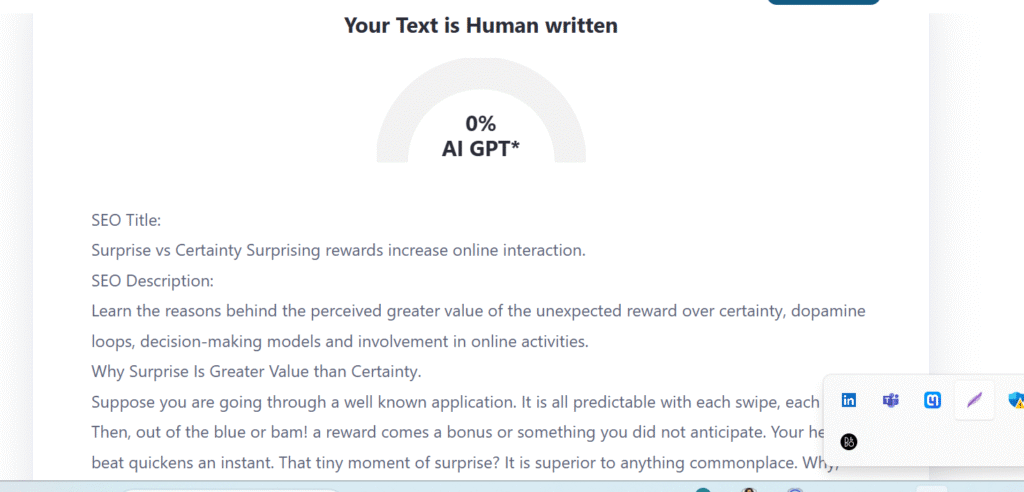
Suppose you are going through a well-known application. It is all predictable with each swipe, each click. Then, out of the blue, a reward comes, a bonus, or something you did not anticipate. Your heart beat quickens for an instant. That tiny moment of surprise? It is superior to anything commonplace. Why, however, is uncertainty–or even a slight shock of novelty–more valuable than certainty?
The Subtle Power of Surprise
Certainty is initially perfect. Known results save on stress, energy, and simplify the decision-making process. However, humans are naturally inclined to seek novelty. Psychologists refer to this as the reward prediction error: when something good results from an action, the brain becomes flooded with dopamine, the chemical associated with anticipation and pleasure.
Small surprises, such as a compliment, the news of a sale, or the discovery of a new functionality on a platform, are stimuli that can initiate this chemical loop. It is a refreshing change from what is elsewhere rather ordinary. That is why digital spaces, particularly those where occasional contact is the norm, can be so alluring. Games like GranaWin Finland utilize these mechanics unobtrusively: first-time deposit bonuses and place value rewards generate that spike of excitement without coercion, rather than trying to create it directly.
Why Certainty Feels Bland
When the results are predictable, the brain receives minimal novelty information. Our brain dopamine loop, which signals that this is rewarding, does not increase. That is why it is tiresome to do the same thing every day; the mind must be unpredictable to keep it interesting and emotionally stimulating.
This is what is termed “decision fatigue” by behavioural economists. The brain is continually working out what is likely to happen. It is already aware of the future; there is no need to expend energy, and as a result, there is no enjoyment. Surprisingly, it is cognitively arousing. It creates curiosity, inspires searching and makes the little rewards gigantic.
On the Science of the Thrill.
Neuroscientists have examined the impact of novelty and unpredictability on the brain. Some of the key players include the dopaminergic circuits, the prefrontal cortex and the ventral striatum. These regions are activated when the reward is unpredictable or unnaturally bountiful, which results in pleasure and strengthens the behaviour that even caused the surprise.
Variable rewards, a fundamental behavioural concept in behavioural psychology, exploit this mechanism. The fact that one does not know precisely when the reward will be issued keeps the brain alert, engaged and motivated to repeat the behavior. It is why one-shot experiences in slot machines, random rewards in applications, or other digital rewards may be more appetizing than predictable and regular results.
Surprises in the Digital World.
The idea that surprise is more important than certainty is ubiquitous on the Internet. Alerts, notifications, and special offers that can only be used for a limited time all capitalize on the human tendency to overestimate the unexpected. Variable rewards keep users engaged even in non-gambling contexts, as they are similar to those found in gambling, such as on a gaming platform, an e-commerce application, or a loyalty program.
Consider the example of a first deposit bonus on one of the platforms, such as GranaWin Finland. The initial deposit bonus is not a gift in the traditional sense, but rather packaged to appear like a personalized and unpredictable gift. This exploits a larger behavioural mechanism: people are very responsive to perceived chance and luck, even online in manipulated digital spaces. The expectation, followed by the reward, triggers the dopamine loop and reinforces engagement, eliminating the need for coercion.
Other online interactions operate similarly. A flash notification of a surprise unlocks in one of the apps or a sudden discount in an online shop might be insignificant, but they are using the same cognitive biases. Variable rewards, also known as gamified reinforcement, are small micro-doses of excitement that keep people coming back, often without their awareness of the underlying reason.
Psychologists’ Opinions about Behavioural Patterns.
Behavioural economists observe that we tend to prefer the feeling of uncertainty because it is evolutionarily beneficial. Detecting novelty helped early humans identify new food sources or potential dangers. This same wiring, which makes random rewards disproportionately valuable, is also present in the modern digital world.
The instant gratification and dopamine loop behavioural patterns are exaggerated through the Internet. It is vital to be aware of these mechanisms so that we do not avoid engagement, but also because we know why we may overvalue surprise and underrate the desirability of consistency. For example, a simple incentive, such as a random bonus or surprise feature, can have a significant impact on user satisfaction and perceived value.
The combination of predictability and unpredictability is sensitive. Excessive confidence can be dull, whereas excessive randomness can be stressful. Those platforms that learn how to strike this balance and respond to it through the subtle interface of variable rewards, without violating the user experience, demonstrate the intersection of behavioural science with digital engagement strategies.


